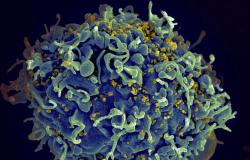The Covid-19 virus has different strategies to infect cells in different regions of the human body. Research by the State University of Campinas (Unicamp) and partner institutions brings new answers about how this virus acts and shows that it modifies proteins, changing everything from the structure of cells to particular biological processes such as energy production. Published on Wednesday (27) in the magazine “Scientific Reports”, the findings advance research in the area and can be used to formulate new medicines and treatments for Covid-19.
To understand the infection process caused by Sars-Cov-2, researchers mapped the total set of proteins from different cells, using a tool called proteomics. In total, more than 3,000 proteins were mapped from nine different cell types infected by the virus, including cells from the brain, blood, digestive system and adipose tissue, which stores fat.
In total, the researchers found 1,652 proteins that had their production increased or decreased in response to the infection. Additionally, they found that the infection affected 151 biochemical reactions that process proteins and other molecules to keep our bodies functioning properly.
The work demonstrates that, during infection, the virus causes an imbalance in the production of proteins in each cell, in different cells of the human body. When this happens, the biological functions related to these proteins become deregulated, impairing the body’s functioning.
Each cell type presented its own protein profile and altered biological activities. While some cells had more significant changes in cellular transport processes, others showed changes in cellular structure, for example. This deepens knowledge about how the Covid-19 virus infects each type of cell in the human body. Daniel Martins-de-Souza, co-author of the study, explains: “Initially, we thought that Covid-19 was a respiratory disease. Then, we saw how versatile the virus is, because it is capable of invading other cell types.”
Despite the uniqueness of each cell, one process was altered in all cell types analyzed: energy metabolism, that is, the way cells produce and deal with energy. According to the study, this may have been a mechanism used by the virus to multiply within the body and ensure its survival. “The virus takes over the cellular machinery and starts using the energy production mechanism to replicate itself, which can harm or even exhaust the cell”, explains the researcher.
For Martins-de-Souza, understanding the specific responses that the virus activates in each type of cell is essential to formulate more specialized treatments or those focused on the consequences of Covid-19, which depend on the infected cell. “Knowing what affects a liver cell, for example, is important for treating people who have developed liver problems due to Sars-Cov-2 infection, and so on.”
The study paves the way for future studies that investigate the mechanisms of action of the virus. To help with future projects, the Unicamp research group developed a virtual tool that allows accessing each protein individually and checking how it was changed in each cell. This database can be used by different research groups.






